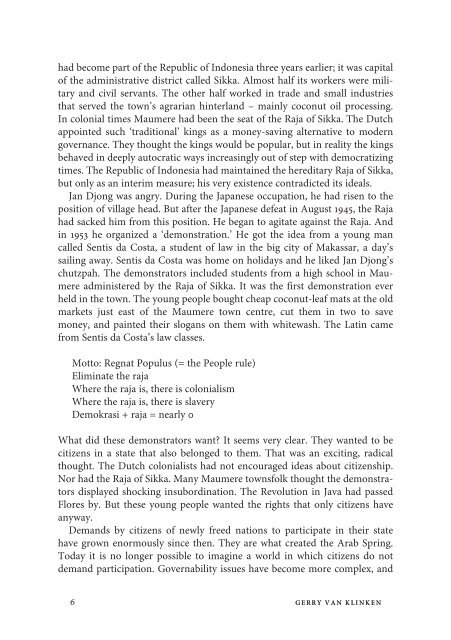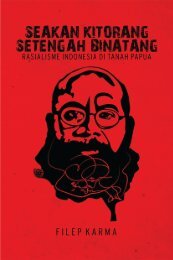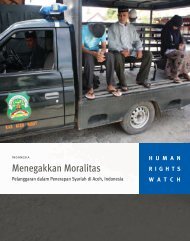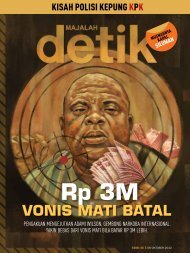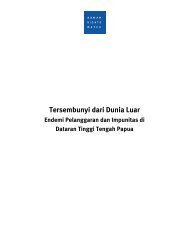Postcolonial Citizenship
PDF-6104Weboratie_Van_Klinken_-_DEF
PDF-6104Weboratie_Van_Klinken_-_DEF
Create successful ePaper yourself
Turn your PDF publications into a flip-book with our unique Google optimized e-Paper software.
had become part of the Republic of Indonesia three years earlier; it was capital<br />
of the administrative district called Sikka. Almost half its workers were military<br />
and civil servants. The other half worked in trade and small industries<br />
that served the town’s agrarian hinterland – mainly coconut oil processing.<br />
In colonial times Maumere had been the seat of the Raja of Sikka. The Dutch<br />
appointed such ‘traditional’ kings as a money-saving alternative to modern<br />
governance. They thought the kings would be popular, but in reality the kings<br />
behaved in deeply autocratic ways increasingly out of step with democratizing<br />
times. The Republic of Indonesia had maintained the hereditary Raja of Sikka,<br />
but only as an interim measure; his very existence contradicted its ideals.<br />
Jan Djong was angry. During the Japanese occupation, he had risen to the<br />
position of village head. But after the Japanese defeat in August 1945, the Raja<br />
had sacked him from this position. He began to agitate against the Raja. And<br />
in 1953 he organized a ‘demonstration.’ He got the idea from a young man<br />
called Sentis da Costa, a student of law in the big city of Makassar, a day’s<br />
sailing away. Sentis da Costa was home on holidays and he liked Jan Djong’s<br />
chutzpah. The demonstrators included students from a high school in Maumere<br />
administered by the Raja of Sikka. It was the first demonstration ever<br />
held in the town. The young people bought cheap coconut-leaf mats at the old<br />
markets just east of the Maumere town centre, cut them in two to save<br />
money, and painted their slogans on them with whitewash. The Latin came<br />
from Sentis da Costa’s law classes.<br />
Motto: Regnat Populus (= the People rule)<br />
Eliminate the raja<br />
Where the raja is, there is colonialism<br />
Where the raja is, there is slavery<br />
Demokrasi + raja = nearly 0<br />
What did these demonstrators want? It seems very clear. They wanted to be<br />
citizens in a state that also belonged to them. That was an exciting, radical<br />
thought. The Dutch colonialists had not encouraged ideas about citizenship.<br />
Nor had the Raja of Sikka. Many Maumere townsfolk thought the demonstrators<br />
displayed shocking insubordination. The Revolution in Java had passed<br />
Flores by. But these young people wanted the rights that only citizens have<br />
anyway.<br />
Demands by citizens of newly freed nations to participate in their state<br />
have grown enormously since then. They are what created the Arab Spring.<br />
Today it is no longer possible to imagine a world in which citizens do not<br />
demand participation. Governability issues have become more complex, and<br />
6 GERRYVANKLINKEN


